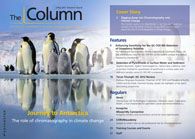Non-invasive test for the diagnosis of pancreatic cancer
A team of researchers from the Kobe University Graduate School of Medicine in Japan have developed a metabolomics-based approach to diagnose early-stage pancreatic cancer.1 The method uses gas chromatography coupled to mass spectrometry (GC?MS).
A team of researchers from the Kobe University Graduate School of Medicine in Japan have developed a metabolomics-based approach to diagnose early-stage pancreatic cancer.1 The method uses gas chromatography coupled to mass spectrometry (GC–MS).
Corresponding author Dr Masaru Yoshida commented: “Although surgical resection can be a curative treatment for pancreatic cancer, more than 80% of patients with pancreatic cancer have a locally advanced or metastatic tumour that is unresectable at the time of detection.” This is why scientists globally are trying to develop new methodsto detect the cancer in the earlier stages.
The team collected serum samples from 43 patients diagnosed with pancreatic cancer and 42 healthy volunteers. The analysis of the samples was challenging for the investigators. According to Yoshida, it was tough to measure several hundred metabolites in the serum samples at the same time with GC–MS.
The serum samples were compared from the two patient groups — in total, 159 metabolites were detected with 18 found to be significantly altered. The team developed and optimized the GC–MS method and selected four metabolites of interest to establish a diagnostic formula.
According to Yoshida, the novel diagnostic approach is safe and easy to apply. He told The Column that it is “expected to improve prognosis of patients diagnosed with pancreatic cancer by detecting their cancer early, when still in a resectable and curable state.”
Reference
1. T. Kobayashi et al, Cancer, Epidemiology, Biomarkers & Prevention,DOI:10.1158/1055-9965 (2013).
This story originally appeared in The Column. Click here to view that issue.

Removing Double-Stranded RNA Impurities Using Chromatography
April 8th 2025Researchers from Agency for Science, Technology and Research in Singapore recently published a review article exploring how chromatography can be used to remove double-stranded RNA impurities during mRNA therapeutics production.
The Effect of Time and Tide On PFAS Concentrations in Estuaries
April 8th 2025Oliver Jones and Navneet Singh from RMIT University, Melbourne, Australia discuss a recent study they conducted to investigate the relationship between tidal cycles and PFAS concentrations in estuarine systems, and offer practical advice on the sample preparation and LC–MS/MS techniques they used to achieve the best results.










